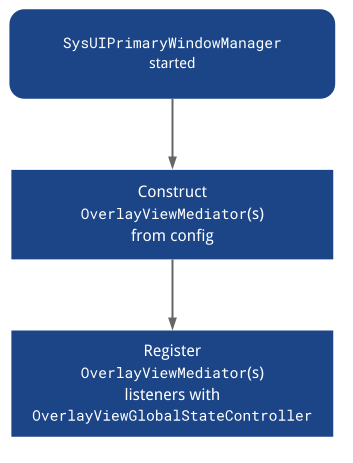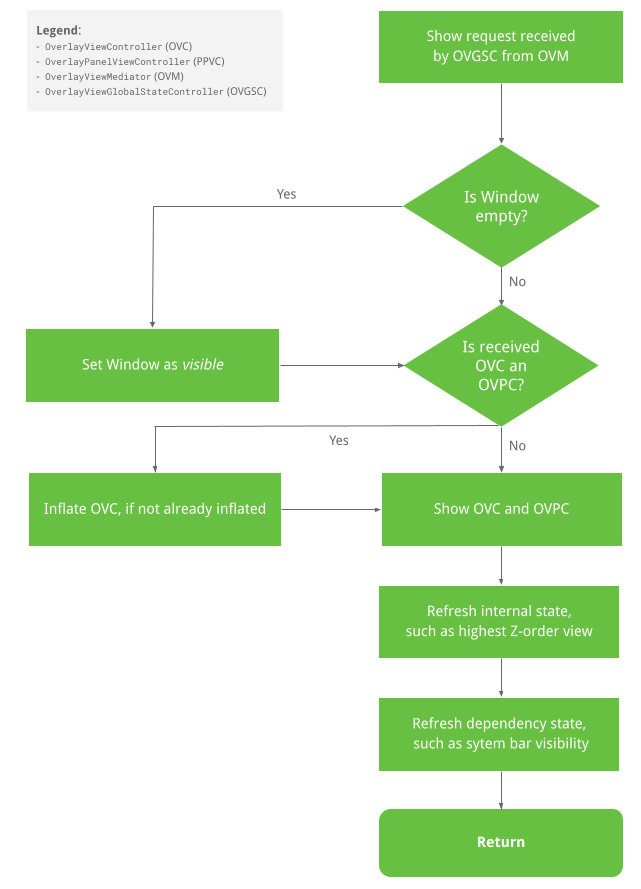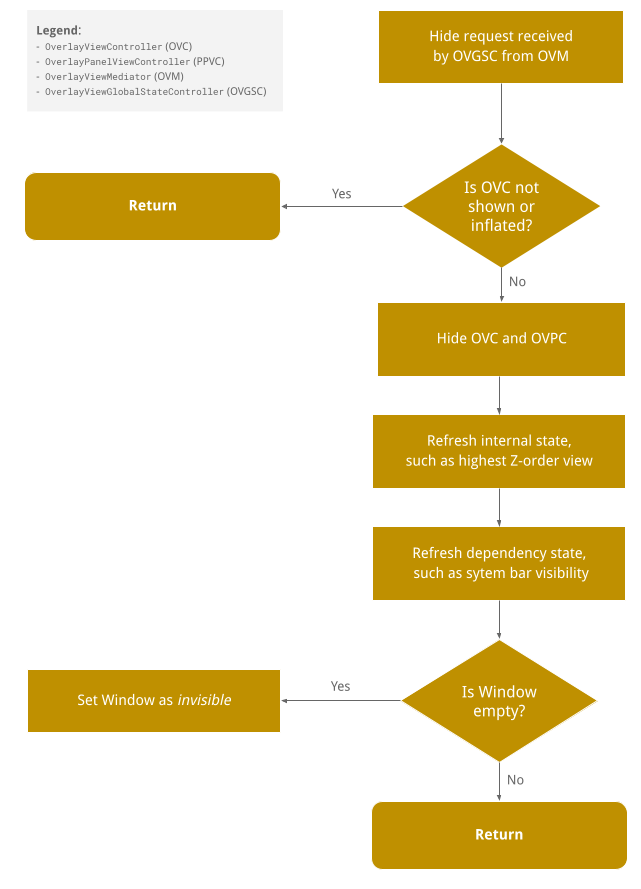ระบบการจัดการ SystemUIOverlayWindow ช่วยให้คุณแสดงและจัดการมุมมองใน SystemUIOverlayWindow ได้ ปัจจุบันหน้าต่างนี้ใช้สำหรับมุมมองต่างๆ ซึ่งรวมถึงตัวสลับผู้ใช้แบบเต็มหน้าจอ แผงการแจ้งเตือน และโปรแกรมรักษาความปลอดภัย หน้านี้จะไม่มีลักษณะต่อไปนี้
- สร้างข้อจำกัดเกี่ยวกับสิ่งที่ OEM สามารถเพิ่มลงในกรอบเวลาได้
- บังคับให้คุณใช้การแยกความคิดตามที่อธิบายไว้ในหน้านี้
ภาพรวม
คุณสามารถใช้SystemUIOverlayWindowระบบการจัดการเพื่อแสดงมุมมองต่างๆ เช่น ประกาศทางกฎหมาย ตัวสลับผู้ใช้แบบเต็มหน้าจอ กล้องมองหลัง การควบคุมระบบปรับอากาศ (HVAC) และระบบล็อก หน้าต่างนี้อยู่นอกพื้นที่แอปและให้คุณควบคุมลําดับ Z ของมุมมอง เงื่อนไขการเปิด/ปิด และการปรับแต่งโดยรวม ซึ่งรวมถึงตําแหน่ง มุมมอง ขนาด ความโปร่งใส และสี ในขณะเดียวกัน คุณก็ไม่จําเป็นต้องกังวลเกี่ยวกับสถานะของแถบระบบหรือออบเจ็กต์ UI ของระบบอื่นๆ ที่ต้องซ่อนหรือแสดงเมื่อมุมมองที่เกี่ยวข้องซ่อนหรือแสดง
หากต้องการใช้ประโยชน์จาก SystemUIOverlayWindow ให้สร้างตัวควบคุมมุมมองสําหรับสื่อกลางมุมมอง ระบบจะส่งสื่อกลางไปยังตัวควบคุมสถานะส่วนกลางของหน้าต่าง ตัวสื่อกลางการแสดงผลเหล่านี้
- ประสานงานระหว่างตัวควบคุมมุมมอง
- เก็บตรรกะทางธุรกิจสําหรับตัวควบคุมมุมมอง
ตัวควบคุมมุมมอง (ประสานงานโดยสื่อกลางของมุมมอง)
- เป็นเจ้าของมุมมอง
- สร้างตัวตั้งค่าที่
OverlayViewsMediatorจะใช้แนบตรรกะทางธุรกิจได้ - สร้างภาพเคลื่อนไหวแสดงและซ่อนมุมมอง
SystemUIOverlayWindowManager ซึ่งเป็นคอมโพเนนต์ SystemUI ทำหน้าที่เป็นจุดแรกเข้าเพื่อเริ่มต้นและลงทะเบียนสื่อกลางกับตัวควบคุมสถานะส่วนกลาง ขณะที่ตัวควบคุมสถานะส่วนกลางจะเชื่อมโยงกับตัวควบคุมมุมมองในลักษณะที่สื่อกลางสามารถเรียกตัวควบคุมมุมมองโดยตรงเพื่อแสดงและซ่อนมุมมองในหน้าต่าง
OverlayViewController
OverlayViewController
เป็นผู้รับผิดชอบต่อมุมมองที่แสดงใน SystemUIOverlayWindow และควบคุมวิธีแสดงและซ่อนมุมมอง นอกจากนี้ยังช่วยให้แนบ Listener ที่จำเป็นเพื่อให้เชื่อมโยงกับตรรกะทางธุรกิจได้
ลายเซ็นเมธอดที่สําคัญ
/**
* Owns a {@link View} that is present in SystemUIOverlayWindow.
*/
public class OverlayViewController {
/**
* Shows content of {@link OverlayViewController}.
*
* Should be used to show view externally and in particular by {@link OverlayViewMediator}.
*/
public final void start();
/**
* Hides content of {@link OverlayViewController}.
*
* Should be used to hide view externally and in particular by {@link OverlayViewMediator}.
*/
public final void stop();
/**
* Inflate layout owned by controller.
*/
public final void inflate(ViewGroup baseLayout);
/**
* Called once inflate finishes.
*/
protected void onFinishInflate();
/**
* Returns {@code true} if layout owned by controller has been inflated.
*/
public final boolean isInflated();
/**
* Subclasses should override this method to implement reveal animations and implement logic
* specific to when the layout owned by the controller is shown.
*
* Should only be overridden by Superclass but not called by any {@link OverlayViewMediator}.
*/
protected void showInternal();
/**
* Subclasses should override this method to implement conceal animations and implement logic
* specific to when the layout owned by the controller is hidden.
*
* Should only be overridden by Superclass but not called by any {@link OverlayViewMediator}.
*/
protected void hideInternal();
/**
* Provides access to layout owned by controller.
*/
protected final View getLayout();
/** Returns the {@link OverlayViewGlobalStateController}. */
protected final OverlayViewGlobalStateController getOverlayViewGlobalStateController();
/** Returns whether the view controlled by this controller is visible. */
public final boolean isVisible();
/**
* Returns the ID of the focus area that should receive focus when this view is the
* topmost view or {@link View#NO_ID} if there is no focus area.
*/
@IdRes
protected int getFocusAreaViewId();
/** Returns whether the view controlled by this controller has rotary focus. */
protected final boolean hasRotaryFocus();
/**
* Sets whether this view allows rotary focus. This should be set to {@code true} for the
* topmost layer in the overlay window and {@code false} for the others.
*/
public void setAllowRotaryFocus(boolean allowRotaryFocus);
/**
* Refreshes the rotary focus in this view if we are in rotary mode. If the view already has
* rotary focus, it leaves the focus alone. Returns {@code true} if a new view was focused.
*/
public boolean refreshRotaryFocusIfNeeded();
/**
* Returns {@code true} if heads up notifications should be displayed over this view.
*/
protected boolean shouldShowHUN();
/**
* Returns {@code true} if navigation bar insets should be displayed over this view. Has no
* effect if {@link #shouldFocusWindow} returns {@code false}.
*/
protected boolean shouldShowNavigationBarInsets();
/**
* Returns {@code true} if status bar insets should be displayed over this view. Has no
* effect if {@link #shouldFocusWindow} returns {@code false}.
*/
protected boolean shouldShowStatusBarInsets();
/**
* Returns {@code true} if this view should be hidden during the occluded state.
*/
protected boolean shouldShowWhenOccluded();
/**
* Returns {@code true} if the window should be focued when this view is visible. Note that
* returning {@code false} here means that {@link #shouldShowStatusBarInsets} and
* {@link #shouldShowNavigationBarInsets} will have no effect.
*/
protected boolean shouldFocusWindow();
/**
* Returns {@code true} if the window should use stable insets. Using stable insets means that
* even when system bars are temporarily not visible, inset from the system bars will still be
* applied.
*
* NOTE: When system bars are hidden in transient mode, insets from them will not be applied
* even when the system bars become visible. Setting the return value to {@true} here can
* prevent the OverlayView from overlapping with the system bars when that happens.
*/
protected boolean shouldUseStableInsets();
/**
* Returns the insets types to fit to the sysui overlay window when this
* {@link OverlayViewController} is in the foreground.
*/
@WindowInsets.Type.InsetsType
protected int getInsetTypesToFit();
/**
* Optionally returns the sides of enabled system bar insets to fit to the sysui overlay window
* when this {@link OverlayViewController} is in the foreground.
*
* For example, if the bottom and left system bars are enabled and this method returns
* WindowInsets.Side.LEFT, then the inset from the bottom system bar will be ignored.
*
* NOTE: By default, this method returns {@link #INVALID_INSET_SIDE}, so insets to fit are
* defined by {@link #getInsetTypesToFit()}, and not by this method, unless it is overridden
* by subclasses.
*
* NOTE: {@link #NO_INSET_SIDE} signifies no insets from any system bars will be honored. Each
* {@link OverlayViewController} can first take this value and add sides of the system bar
* insets to honor to it.
*
* NOTE: If getInsetSidesToFit is overridden to return {@link WindowInsets.Side}, it always
* takes precedence over {@link #getInsetTypesToFit()}. That is, the return value of {@link
* #getInsetTypesToFit()} will be ignored.
*/
@WindowInsets.Side.InsetsSide
protected int getInsetSidesToFit();
}OverlayPanelViewController
ตัวควบคุม OverlayPanelViewController ขยาย OverlayViewController และให้ความสามารถเพิ่มเติมในการลากภาพเคลื่อนไหวแก่ซุปเปอร์คลาส
OverlayViewMediator
OverlayViewMediator เก็บตรรกะทางธุรกิจที่แสดงหรือซ่อนOverlayViewControllerหลายอินสแตนซ์ ดังนั้นจึงจัดการการประสานงานระหว่างตัวควบคุมมุมมองด้วย
/** * Controls when to show and hide {@link OverlayViewController}(s). */ public interface OverlayViewMediator { /** * Register listeners that could use ContentVisibilityAdjuster to show/hide content. * * Note that we do not unregister listeners because SystemUI components are expected to live * for the lifecycle of the device. */ void registerListeners(); /** * Allows for post-inflation callbacks and listeners to be set inside required {@link * OverlayViewController}(s). */ void setupOverlayContentViewControllers(); }
SystemUIOverlayWindowManager
SystemUIOverlayWindowManager
มีหน้าที่เป็นออบเจ็กต์ SystemUI ที่ทำหน้าที่เป็นจุดแรกเข้าสำหรับSystemUIOverlayWindowระบบการจัดการเพื่อเริ่มต้นและลงทะเบียนOverlayViewMediatorอินสแตนซ์กับ OverlayViewGlobalStateController

OverlayViewGlobalStateController
OverlayViewGlobalStateController รับสายจากอินสแตนซ์ OverlayViewController เพื่อเปิดเผยหรือซ่อนตัว ดังนั้น SystemUIOverlayWindow จึงเก็บสถานะของสิ่งที่แสดงหรือซ่อนไว้ด้วย
ขั้นตอนการแสดงผลรายการแสดงอยู่ด้านล่าง

ซ่อนโฟลว์มุมมอง
ขั้นตอนในการซ่อนมุมมองแสดงอยู่ด้านล่าง

ลายเซ็นเมธอดสาธารณะ
ลายเซ็นเมธอดสาธารณะจะเข้ารหัสดังนี้
/**
* This controller is responsible for the following:
* <p><ul>
* <li>Holds the global state for SystemUIOverlayWindow.
* <li>Allows {@link SystemUIOverlayWindowManager} to register {@link OverlayViewMediator}(s).
* <li>Enables {@link OverlayViewController)(s) to reveal/conceal themselves while respecting the
* global state of SystemUIOverlayWindow.
* </ul>
*/
@SysUISingleton
public class OverlayViewGlobalStateController {
/**
* Register {@link OverlayViewMediator} to use in SystemUIOverlayWindow.
*/
public void registerMediator(OverlayViewMediator overlayViewMediator);
/**
* Show content in Overlay Window using {@link OverlayPanelViewController}.
*
* This calls {@link OverlayViewGlobalStateController#showView(OverlayViewController, Runnable)}
* where the runnable is nullified since the actual showing of the panel is handled by the
* controller itself.
*/
public void showView(OverlayPanelViewController panelViewController);
/**
* Show content in Overlay Window using {@link OverlayViewController}.
*/
public void showView(OverlayViewController viewController, @Nullable Runnable show);
/**
* Hide content in Overlay Window using {@link OverlayPanelViewController}.
*
* This calls {@link OverlayViewGlobalStateController#hideView(OverlayViewController, Runnable)}
* where the runnable is nullified since the actual hiding of the panel is handled by the
* controller itself.
*/
public void hideView(OverlayPanelViewController panelViewController);
/**
* Hide content in Overlay Window using {@link OverlayViewController}.
*/
public void hideView(OverlayViewController viewController, @Nullable Runnable hide);
/** Returns {@code true} is the window is visible. */
public boolean isWindowVisible();
/**
* Sets the {@link android.view.WindowManager.LayoutParams#FLAG_ALT_FOCUSABLE_IM} flag of the
* sysui overlay window.
*/
public void setWindowNeedsInput(boolean needsInput);
/** Returns {@code true} if the window is focusable. */
public boolean isWindowFocusable();
/** Sets the focusable flag of the sysui overlawy window. */
public void setWindowFocusable(boolean focusable);
/** Inflates the view controlled by the given view controller. */
public void inflateView(OverlayViewController viewController);
/**
* Return {@code true} if OverlayWindow is in a state where HUNs should be displayed above it.
*/
public boolean shouldShowHUN();
/**
* Set the OverlayViewWindow to be in occluded or unoccluded state. When OverlayViewWindow is
* occluded, all views mounted to it that are not configured to be shown during occlusion will
* be hidden.
*/
public void setOccluded(boolean occluded);
}วิธีเพิ่มมุมมองไปยัง SysUIOverlayWindow
โปรดดูรายละเอียดที่ Codelab
ขั้นตอนที่ 1: เพิ่ม ViewStub ลงใน SysUIOverlayWindow
เพิ่ม ViewStub
ลงในเลย์เอาต์หน้าต่าง
ขั้นตอนที่ 2: สร้าง OverlayViewController
ใช้ ViewStub ใหม่เพื่อสร้างไฟล์ OverlayViewController ที่ฉีดได้
ขั้นตอนที่ 3: OverlayViewMediator
สร้างอินเจ็กต์ใหม่
OverlayViewMediator หรือใช้อินเจ็กต์ที่มีอยู่ (ข้ามขั้นตอนที่ 4) และลงทะเบียน Listeners เพื่อซ่อนหรือแสดงอินเจ็กต์ใหม่
OverlayViewController
ขั้นตอนที่ 4: กำหนดค่า OverlayViewMediator ใหม่
เพิ่ม OverlayViewMediator ใหม่ลงใน
OverlayWindowModule และ config_carSystemUIOverlayViewsMediator
ข้อจำกัด
เมื่อ SysUIPrimaryWindow ครอบคลุมทั้งหน้าจอ องค์ประกอบที่อยู่ใต้หน้าต่างจะไม่บันทึกเหตุการณ์การสัมผัส ดังนั้น เมื่อหน้าต่างครอบคลุมทั้งหน้าจอ แต่เนื้อหาของหน้าต่างมีบางส่วนที่ว่างเปล่า คุณสามารถเลือกเบลอพื้นที่ว่างเปล่านั้นและแนบ Listener กับพื้นที่ว่างนั้นเพื่อปิดเนื้อหาในหน้าต่าง
